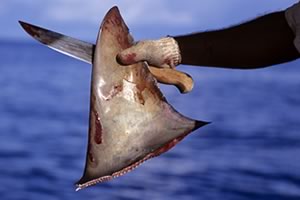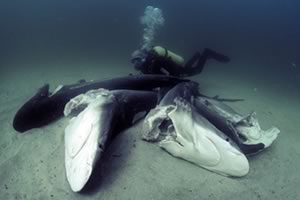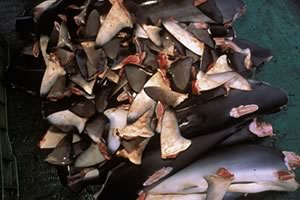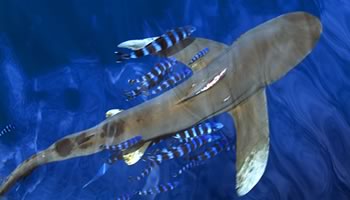SHARK Campaigns

Fins are hacked off of live sharks in a wasteful process called "finning" to make shark fin soup.
© Photography by Jeff Rotman
Support Our Shark Campaign
Over 100 million sharks are slaughtered annually, at a rate of over 270, 000 per day. This all to fuel the shark fin trade market for shark fin soup. Shark fin soup is a delicacy in some Asian cultures. The soup can fetch up to several hundred U.S. dollars per bowl. Some fins can fetch thousands of dollars depending on the rarity of the shark species as well as fin age and type.
Get your Tribal Shark Pendant when you Donate to support shark conservation research & to bring the SharkWater documentary to China
Shark fins are harvested from the animals in a process called finning. The practice is wasteful, unsustainable and ecologically unsound. In the process of finning, sharks are caught on long-lines (literally, miles of line floating in the oceans affixed with hooks and bait), brought to the boat, their fins are hacked off, and the mutilated, but live animals are then thrown back in to the water where they die. The shark carcasses are discarded to make space on the boat for more fins since shark meat is not as profitable as fins.
Shark populations are particularly vulnerable to this exploitation due to inherent life history characteristics which feature a pattern of slow growth, late maturity, long gestation, low reproductive output and long life, resulting in a slow rate of population increase. As a result, shark populations worldwide are drastically declining. In the Atlantic alone, shark populations have decreased between 60 and 90 percent depending on species, in just the last 15 years!
Our current Save the Blue SHARK campaign is to stop shark finning by
supporting cutting-edge shark research and education projects.
We currently support work being conducted by scientists across the globe that tackle the shark fin issue from several key angles including human health, shark forensics, education and fisheries.
China is the largest consumer and trader of shark fins worldwide. In a recent survey, over 35% of urban Chinese reported consuming shark fin. In order to stop the demand for shark fin soup we urgently need to drastically raise awareness in China! The award winning documentary SharkWater by filmmaker Rob Stewart is an amazing film exposing the exploitation and corruption involving the shark fin trade. SAVE THE BLUE is supporting Rob Stewart & WildAid to create a Chinese version of SharkWater and distribute the documentary throughout China with the goal of reaching 100 million Chinese viewers.
[ back to top ]

"Finned" Sharks scatter the ocean floor.
© Photography by Jeff Rotman

100 million sharks are slaughtered every year just for their fins. © Photography by Jeff Rotman
Shark fins are primarily consumed in Asian countries as a cultural sign of wealth thought to even be an aphrodisiac. However, University of Miami scientists Dr. Deborah Mash (Medical School), Dr. Larry Brand (Marine School/RSMAS) and Neil Hammerschlag (Marine School/RSMAS) are studying the presence of deadly neurotoxins in shark fins linked to prevalent and severe human neurodegenerative diseases, which as of yet have no cure. A discovery that the consumption of shark fins will cause a high risk of these severe human neurodegenerative diseases will help lower the demand for fins and slaughter of sharks.
It is almost imposible to identify disembodied shark fins based only on their appearance. This makes regulating the shark fin trade and preventing the illegal trade of shark fins impossible. Dr. Mahmood Shivji and scientists at the Nova Southeastern University Guy Harvey Research Institute are developing DNA-based forensic techniques and markers to rapidly identify shark carcasses, dried shark fins, and other products obtained from shark fisheries and fin markets. These forensic approaches are being used to help monitor and prevent the illegal trade of shark fins across the globe.
Tackling the issues from key angles: human health, forensics, education, multi-media & fisheries.
Many sharks are unintentionally caught on commercial fishing long-lines targeting tuna and/or swordfish. For example, between 1997 and 1998, 450, 000 blue sharks alone were taken by the tuna long-line fishery in New Zealand alone. Dr. Samuel Gruber of the Bimini Biological Field Station and Scientists from Shark Defense are developing both chemical and magnetic shark repellents. The goal of this research is to eventually create a repellent to put on commercial fishing gear to eliminate the unintentional catch of sharks.
Education and outreach is an effective conservational tool. The University of Miami - South Florida Student Shark Program (SFSSP) is a collaborative, multi-disciplinary research, education and outreach program supporting the career development for graduate, undergraduate as well as high school students. Focusing on the study and conservation of Floridian shark species, mangrove fish habitat, the program encourages students to take an active role in modern scientific education & research. The SFSSPÕs full-immersion approach allows students to actively grow as future scientists, while supporting the important ongoing research crucial to shark conservation.
Your donations to SAVE THE BLUE will support these and other projects aimed at protecting sharks and stopping shark finning.
So please donate and receive and wear your exclusive tribal shark pendant and know that you are helping to SAVE THE BLUE!!
[ back to top ]


